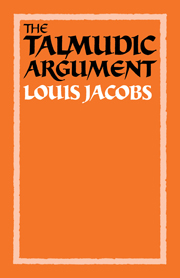Book contents
- Frontmatter
- Contents
- Preface
- Note on transliteration
- Note on Biblical translations
- Note on the Babylonian Talmud
- List of Abbreviations
- 1 The Talmudic argument
- 2 The literary form of the Babylonian Talmud
- 3 Berērah: retrospective specification
- 4 Yeúsh she-lo mi-da‘at: unconscious abandonment of property
- 5 Rubba: probability
- 6 Davar she-lo ba le-'olam: conveyance of a thing not yet in existence
- 7 Kol she-eyno be-zeh aḥar zeh afilu be-vat aḥat eyno: whatever cannot be established in a consecutive sequence cannot be established even in a simultaneous sequence
- 8 Yesh ḥoresh telem eḥad: a single act of ploughing can result in a number of penalties
- 9 Simanin de-oraita o de-rabbanan: whether reliance on distinguishing marks for the purpose of identification is Biblical or Rabbinic
- 10 Devarim she-be-lev eynam devarim: mental reservations in contracts are disregarded
- 11 Ḥazakah: presumptive state
- 12 Gadol kevod ha-beriot: the law and regard for human dignity
- 13 Hazmanah milta: whether the designation of an object for a particular use is effective
- 14 Mitzvat ‘aseh she-ha-zeman geramah: positive precepts dependent on time from which women are exempt
- 15 Heyzek she-eyno nikar: indiscernible damage to property
- 16 Kinyan ḥatzer: acquisition by means of a domain
- 17 Palginan be-dibbura: admission of part of a testimony even though another part of the same testimony is rejected
- 18 Tadir u-mekuddash: which takes precedence: the more constant or the more sacred?
- 19 Palga nizka: the nature of the payment of half-damages to which the owner of a goring ox is liable
- 20 Patur mi-diney adam ve-ḥayyav be-diney shamayim: cases where there is liability in the eyes of God even though the human courts cannot enforce payment
- 21 Maḥal ‘al kevodo kevodo maḥul: renunciation of honour by one to whom it is due
- 22 Conclusions
- Glossary
- Bibliography
6 - Davar she-lo ba le-'olam: conveyance of a thing not yet in existence
Published online by Cambridge University Press: 06 January 2010
- Frontmatter
- Contents
- Preface
- Note on transliteration
- Note on Biblical translations
- Note on the Babylonian Talmud
- List of Abbreviations
- 1 The Talmudic argument
- 2 The literary form of the Babylonian Talmud
- 3 Berērah: retrospective specification
- 4 Yeúsh she-lo mi-da‘at: unconscious abandonment of property
- 5 Rubba: probability
- 6 Davar she-lo ba le-'olam: conveyance of a thing not yet in existence
- 7 Kol she-eyno be-zeh aḥar zeh afilu be-vat aḥat eyno: whatever cannot be established in a consecutive sequence cannot be established even in a simultaneous sequence
- 8 Yesh ḥoresh telem eḥad: a single act of ploughing can result in a number of penalties
- 9 Simanin de-oraita o de-rabbanan: whether reliance on distinguishing marks for the purpose of identification is Biblical or Rabbinic
- 10 Devarim she-be-lev eynam devarim: mental reservations in contracts are disregarded
- 11 Ḥazakah: presumptive state
- 12 Gadol kevod ha-beriot: the law and regard for human dignity
- 13 Hazmanah milta: whether the designation of an object for a particular use is effective
- 14 Mitzvat ‘aseh she-ha-zeman geramah: positive precepts dependent on time from which women are exempt
- 15 Heyzek she-eyno nikar: indiscernible damage to property
- 16 Kinyan ḥatzer: acquisition by means of a domain
- 17 Palginan be-dibbura: admission of part of a testimony even though another part of the same testimony is rejected
- 18 Tadir u-mekuddash: which takes precedence: the more constant or the more sacred?
- 19 Palga nizka: the nature of the payment of half-damages to which the owner of a goring ox is liable
- 20 Patur mi-diney adam ve-ḥayyav be-diney shamayim: cases where there is liability in the eyes of God even though the human courts cannot enforce payment
- 21 Maḥal ‘al kevodo kevodo maḥul: renunciation of honour by one to whom it is due
- 22 Conclusions
- Glossary
- Bibliography
Summary
The sugya described here is Kiddushin 62a–63a. The sugya is appended to the Mishnah which rules as follows. If a man betroths a woman and one of them is a Gentile but he declares that he wishes the betrothal to take effect after his or her conversion to Judaism, the betrothal is invalid. Similarly, if he is a slave but he declares that he wishes the betrothal to take effect after he or she has been freed, it is invalid. Two further cases are: a man betroths a married woman, the betrothal to take effect when her husband dies; or a man betroths his wife's sister, the betrothal to take effect when his wife dies. Finally, there is the case of a man who declares to his neighbour: ‘If your wife will give birth to a girl she is betrothed to me.’ In all these cases the betrothal is invalid on the following principle: that which cannot take effect now because of some major legal objection does not take effect even when that obstacle is no more.
Davar she-lo ba le-‘olam, the term used in our sugya, means literally ‘a thing that has not yet come into the world’. The question is whether the conveyancing or transfer of something or of something being effected is valid if the thing is not yet in existence. This is formulated by the Amoraím as: ‘a man can transfer [lit. ‘make another acquire’] a thing not yet in existence [adam makneh davar she-lo ba le-'olam]’ or ‘a man cannot transfer a thing not yet in existence [eyn adam makneh davar she-lo ba le-‘olam].’
- Type
- Chapter
- Information
- The Talmudic ArgumentA Study in Talmudic Reasoning and Methodology, pp. 64 - 74Publisher: Cambridge University PressPrint publication year: 1984



